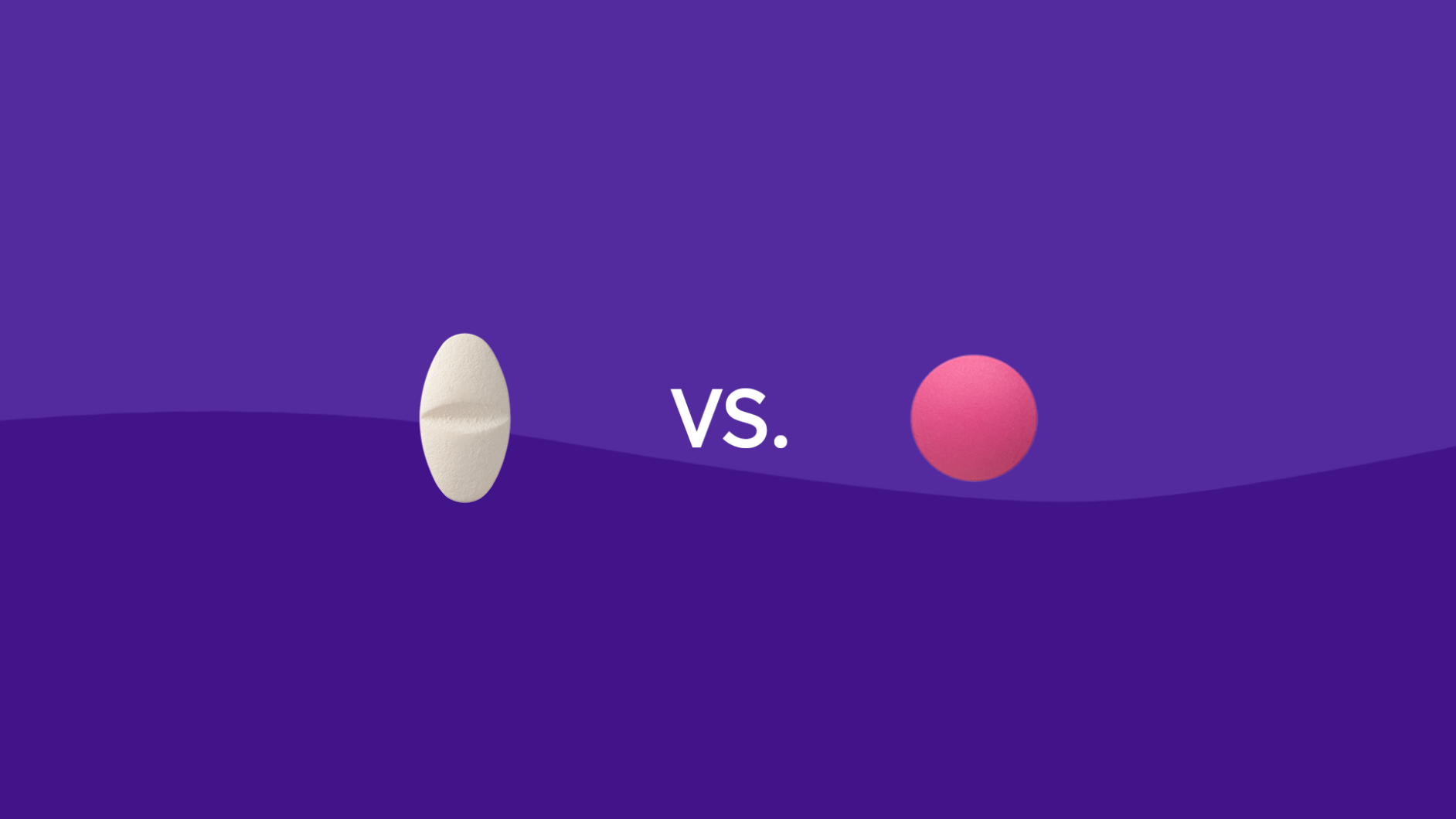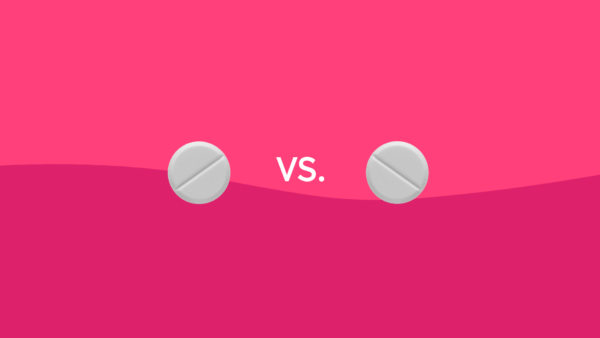Main differences | Treatment | Efficacy | Cost and comparison | Side effects | Drug interactions | Warnings | For children | FAQs
Acetaminophen and ibuprofen are over-the-counter (OTC) medications that treat pain and fever. Although they treat similar symptoms of injuries and illnesses, acetaminophen and ibuprofen are different drugs. Ibuprofen is part of a group of drugs called nonsteroidal anti-inflammatory drugs (NSAIDs), whereas acetaminophen is classified as a non-opioid analgesic and antipyretic. Although it can treat pain and fever similarly to ibuprofen and other NSAIDs, acetaminophen is not an NSAID.
As OTC pain relievers, acetaminophen and NSAIDs can treat headaches and other minor aches or pains. Acetaminophen and ibuprofen are generally short-acting drugs that need to be taken multiple times throughout the day. While both drugs are commonly used medications, they have some differences in side effects and how they’re used. Acetaminophen and ibuprofen also contain different active ingredients and work in different ways.
What are the main differences between acetaminophen and ibuprofen?
Acetaminophen—known by the brand-name Tylenol—is an analgesic (pain reliever) and antipyretic (fever reducer) medication. The exact way in which acetaminophen works is unknown, but it is believed to act on certain receptors in the brain involved with the sensation of pain. It also works on the temperature-regulating area of the brain to reduce fever. Unlike NSAIDs, acetaminophen does not have anti-inflammatory effects and may not work as well for inflammatory conditions, such as rheumatoid arthritis.
Ibuprofen is an NSAID that can be used for pain, inflammation, and fever. Common brand names of ibuprofen include Motrin and Advil. Ibuprofen is a nonselective COX enzyme inhibitor that blocks the production of prostaglandins, which are chemicals that cause inflammation. Because of its effects on the COX enzymes, the use of ibuprofen carries a risk of gastrointestinal (GI) and cardiovascular side effects.
Does acetaminophen or ibuprofen last longer?
A dose of regular acetaminophen or ibuprofen lasts for around four to six hours. The usual dosage of acetaminophen is 325 to 650 mg every four to six hours, while the usual dosage of ibuprofen is 200 to 400 mg every four to six hours. The duration of effects of acetaminophen and ibuprofen can vary based on the dosage form. Extended-release Tylenol and Advil tablets may provide longer-lasting relief than regular tablets.
It is important to follow the dosage instructions on the drug label. Taking too much acetaminophen can cause serious side effects, including liver disease. In rare cases, taking too much ibuprofen may also cause liver disease. Ibuprofen, like other NSAIDs, can cause kidney damage with heavy or long-term use.
The maximum dosage for acetaminophen and ibuprofen can vary, so it’s always a good idea to check with a healthcare provider. For most adults, the maximum dosage of acetaminophen is 3,250 mg per day, while the maximum dosage of ibuprofen is 1,200 mg per day.
RELATED: What is Acetaminophen? | What is Ibuprofen?
| Main differences between acetaminophen and ibuprofen | ||
|---|---|---|
| Acetaminophen | Ibuprofen | |
| Drug class | Analgesic Antipyretic |
Nonsteroidal anti-inflammatory drugs (NSAID) |
| Brand/generic status | Brand and generic versions available | Brand and generic versions available |
| What is the brand name? | Tylenol | Advil, Motrin, Midol, Nuprin |
| What form(s) does the drug come in? | Oral tablet Oral capsule Oral liquid |
Oral tablet Oral capsule Oral liquid |
| What is the standard dosage? | 325 to 650 mg every 4 to 6 hours as needed Maximum daily dose in adults: 3250 mg |
200 mg to 400 mg every 4 to 6 hours as needed Maximum daily dose in adults: 1200 mg |
| How long is the typical treatment? | No more than 10 days or as instructed by a healthcare provider | No more than 10 days or as instructed by a healthcare provider |
| Who typically uses the medication? | Adults and children 6 months and older | Adults and children 6 months and older |
Conditions treated by acetaminophen vs. ibuprofen
Acetaminophen and ibuprofen are both effective pain relievers used to treat mild to moderate pain and fever. Examples of mild to moderate pain include headaches, back pain, toothaches, muscle aches, sprains, and menstrual cramps.
Acetaminophen is FDA-approved for the treatment of minor pain and fever. However, it is also commonly used to treat pain from arthritis, migraines, and dysmenorrhea (painful menstruation). Acetaminophen doesn’t have anti-inflammatory effects and may not be as effective as NSAIDs for these conditions.
Ibuprofen can be used to treat general acute pain and fever. It is also labeled to treat pain and inflammation from arthritis, migraines, and dysmenorrhea (painful menstruation).
Research has also shown that acetaminophen and ibuprofen can be used to treat patent ductus arteriosus in preterm infants. The ductus arteriosus is a major blood vessel in the infant heart that normally closes after birth. However, in some babies, this blood vessel remains open, which can cause heart complications.
| Condition | Acetaminophen | Ibuprofen |
| General acute pain | Yes | Yes |
| Fever | Yes | Yes |
| Pain and inflammation from osteoarthritis | Off-label | Yes |
| Pain and inflammation from rheumatoid arthritis | Off-label | Yes |
| Pain and inflammation from migraine | Off-label | Yes |
| Pain and inflammation from dysmenorrhea | Off-label | Yes |
| Patent ductus arteriosus | Off-label | Off-label |
Is acetaminophen or ibuprofen more effective?
Acetaminophen and ibuprofen may have differences in effectiveness when treating fever and different types of pain. Because of its anti-inflammatory effects, ibuprofen may be more effective than acetaminophen for treating inflammatory pain conditions. However, acetaminophen carries a lower risk of serious side effects than ibuprofen.
In one meta-analysis, ibuprofen was found to be similar to or better than acetaminophen for treating pain and fever in adults and children. Both drugs were also found to be equally safe. One study in the analysis found that acetaminophen is safer with fewer side effects than ibuprofen. This analysis included 85 different studies on adults and children.
For acute and chronic pain conditions, ibuprofen has been shown to be more effective than acetaminophen. In one study, ibuprofen was found to be more effective than paracetamol (another name for acetaminophen) for treating different pain conditions, such as migraines and osteoarthritis. Another study concluded similar results and found that ibuprofen produced better pain relief and tolerability than acetaminophen for osteoarthritis.
Depending on the condition being treated, one treatment option may be preferred over the other. The extent of pain relief from a drug will also differ based on a person’s response to medication and overall pain tolerance. It is best to seek medical advice from a healthcare professional if you or your child experiences pain or fever.
Coverage and cost comparison of acetaminophen vs. ibuprofen
Acetaminophen can be purchased over the counter and is available in generic and brand-name forms. Medicare and most insurance plans may not cover acetaminophen since it’s widely available as a low-cost, generic drug. The average cash price for generic acetaminophen can be as high as $11.99. By using a SingleCare discount card, you can save more and bring the cost down to about $2 for a bottle of generic acetaminophen.
In general, Medicare and most insurance plans will cover ibuprofen if it’s prescribed by a healthcare provider. Ibuprofen is available as a generic or brand-name drug. The usual cash price for ibuprofen is around $15, which may be reduced by using a SingleCare discount card. Depending on the pharmacy you use, the cost can be lowered to around $4 for a bottle of 200 mg ibuprofen tablets.
| Acetaminophen | Ibuprofen | |
| Typically covered by insurance? | No | Yes |
| Typically covered by Medicare? | No | Yes |
| Standard dosage | 325 mg tablets; 2 tablets every 4 to 6 hours | 200 mg tablets: 1 to 2 tablets every 4 to 6 hours |
| Typical Medicare copay | $1 | $0-$22 |
| SingleCare cost | $2+ | $4+ |
Common side effects of acetaminophen and ibuprofen
Side effects of acetaminophen may include nausea, vomiting, constipation, itching, and stomach discomfort. Other possible side effects include skin rash and liver damage.
Ibuprofen can also cause gastrointestinal side effects, including constipation, diarrhea, gas, bloating, nausea, heartburn, and indigestion. In addition, ibuprofen may cause skin rash and kidney problems.
Allergic reactions to acetaminophen and ibuprofen are possible. Signs and symptoms of allergic reactions include rash, shortness of breath, and chest tightness. Seek medical attention if you experience these side effects.
| Acetaminophen vs. ibuprofen side effects | ||||
|---|---|---|---|---|
| Acetaminophen | Ibuprofen | |||
| Side Effect | Applicable? | Frequency | Applicable? | Frequency |
| Nausea | Yes | 34% | Yes | 3–9% |
| Vomiting | Yes | 15% | Yes | 15–22% |
| Constipation | Yes | 5% | Yes | 1–10% |
| Diarrhea | Yes | 1–10% | Yes | 1–3% |
| Headache | Yes | 1–10% | Yes | 1–3% |
| Itching | Yes | 5% | Yes | 1–10% |
| Heartburn | No | – | Yes | 3–9% |
| Dizziness | Yes | 1–10% | Yes | 3–9% |
This may not be a complete list. Consult your doctor or pharmacist for possible side effects.
Source: Micromedex (Acetaminophen), DailyMed (Ibuprofen)
Drug interactions of acetaminophen and ibuprofen
Both acetaminophen and ibuprofen can interact with warfarin (Coumadin), a common blood thinner. Taking acetaminophen or ibuprofen with warfarin may increase the risk of bleeding. Drinking alcohol with acetaminophen or ibuprofen can also thin the blood and increase the risk of bleeding.
Acetaminophen can interact with isoniazid, an antibiotic used to treat tuberculosis. Taking isoniazid can affect how the liver processes acetaminophen and may cause liver damage. Phenytoin and carbamazepine are anticonvulsant drugs that can also increase the risk of liver injury when taken with acetaminophen.
Ibuprofen may interact with more drugs than acetaminophen. Ibuprofen, like other NSAIDs, can increase blood pressure, which can interfere with the effects of blood pressure medications. Certain antidepressants, such as selective serotonin reuptake inhibitors (SSRIs), can increase the risk of bleeding when taken with ibuprofen.
Other drug interactions are possible. Speak with a healthcare provider for more information about possible drug interactions with acetaminophen or ibuprofen.
| Drug | Drug Class | Acetaminophen | Ibuprofen |
| Warfarin | Anticoagulant | Yes | Yes |
| Aspirin | Antiplatelet | No | Yes |
| Isoniazid | Antibiotic | Yes | No |
| Phenytoin Carbamazepine |
Anticonvulsant | Yes | No |
| Sertraline Escitalopram Fluoxetine |
Selective serotonin reuptake inhibitor (SSRI) antidepressant | No | Yes |
| Venlafaxine Desvenlafaxine |
Serotonin-norepinephrine reuptake inhibitor (SNRI) antidepressant | No | Yes |
| Lisinopril Enalapril Losartan Valsartan |
Antihypertensive | No | Yes |
| Methotrexate Pemetrexed |
Antimetabolite | No | Yes |
| Lithium | Mood stabilizer | No | Yes |
| Cyclosporine | Immunosuppressant | No | Yes |
This may not be a complete list of all possible drug interactions. Consult a doctor about all the medications you may be taking.
Warnings of acetaminophen vs. ibuprofen
Acetaminophen is generally well-tolerated. However, taking more than the recommended dose of acetaminophen can increase the risk of serious side effects, such as liver damage. In high doses, acetaminophen is known to be hepatotoxic or damaging to the liver. Ibuprofen is less likely than acetaminophen to cause liver damage.
On the other hand, ibuprofen is more likely to cause gastrointestinal and cardiovascular adverse effects than acetaminophen. Like all NSAIDs, ibuprofen can increase the risk of intestinal and stomach ulcers, especially in people with a history of peptic ulcer disease. Certain acid-reducing medications may help lower the risk of stomach ulcers with NSAIDs.
Taking ibuprofen can also increase the risk of heart attack and stroke, especially in those with a history of heart problems or high blood pressure. Ibuprofen should be avoided to treat pain before, during, or after coronary artery bypass graft (CABG) surgery.
Acetaminophen may be considered safer than ibuprofen for pregnancy. However, these drugs should only be taken during pregnancy if the benefits outweigh the risks. Taking acetaminophen or ibuprofen may cause premature closure of the ductus arteriosus in babies.
Acetaminophen and ibuprofen for children
Many studies show that acetaminophen and ibuprofen are similar for reducing fever in children, although some studies suggest that ibuprofen may be more effective than acetaminophen. In addition to fever, acetaminophen or ibuprofen may be used for minor pain and discomfort in children. The best option will depend on your child’s overall condition.
Acetaminophen and ibuprofen are available in liquid form to make them easier to administer to young children. The dosage for acetaminophen and ibuprofen in children can vary, depending on their age or weight. It’s a good idea to consult with a healthcare provider to determine the most appropriate dosage for your child.
In some cases, acetaminophen and ibuprofen may be combined or alternated for stubborn fevers. Combining acetaminophen and ibuprofen may provide more relief than one medication alone. Using an alternating approach can allow a child to get relief more frequently. For example, you may be able to treat their symptoms every three hours instead of every six hours by alternating acetaminophen and ibuprofen. Talk to a healthcare provider first before combining or alternating these drugs.
Common brand names of acetaminophen
- Tylenol, Paracetamol, Aceta, Panadol (acetaminophen)
- Excedrin (paracetamol/aspirin/caffeine)
- Levacet (acetaminophen/aspirin/caffeine/salicylamide)
- Staflex (acetaminophen/brompheniramine)
- Bupap, Tencon, Bucet (acetaminophen/butalbital)
- Fioricet, Esgic, Isocet, Triad (acetaminophen/butalbital/caffeine)
- Panlor, Trezix (acetaminophen/caffeine/dihydrocodeine systemic)
Common brand names of ibuprofen
- Advil, Motrin (ibuprofen)
- Advil Dual Action (ibuprofen/acetaminophen)
- Advil Allergy Sinus (ibuprofen/chlorpheniramine/pseudoephedrine)
- Advil PM, Motrin PM (ibuprofen/diphenhydramine)
- Duexis (ibuprofen/famotidine)
Frequently asked questions about acetaminophen vs. ibuprofen
What is acetaminophen?
Acetaminophen is an over-the-counter (OTC) analgesic and antipyretic. It is used to treat mild to moderate pain and fever in adults and children. Acetaminophen comes in regular-strength and extra-strength formulations.
What is ibuprofen?
Ibuprofen is a nonsteroidal anti-inflammatory drug (NSAID) that can treat pain and fever. It comes in over-the-counter and prescription strengths. Higher strengths of ibuprofen are often used to treat chronic pain conditions like osteoarthritis.
Are acetaminophen vs. ibuprofen the same?
No. Acetaminophen is known by the brand name Tylenol and is approved to treat pain and fever. Ibuprofen is known by the brand name Advil or Motrin and is approved to treat pain, fever, and inflammation. Ibuprofen also comes in OTC and prescription strengths.
Is acetaminophen vs. ibuprofen better?
Ibuprofen is more effective than acetaminophen for treating inflammatory pain conditions. Ibuprofen is FDA-approved to treat osteoarthritis and rheumatoid arthritis, whereas acetaminophen may be used off-label for these conditions. However, acetaminophen may cause less serious side effects than ibuprofen.
Can I use acetaminophen or ibuprofen while pregnant?
Acetaminophen is considered safer than ibuprofen for pregnant women. Ibuprofen should be avoided in pregnant women due to the risks of adverse effects. The FDA recommends against the use of an NSAID in pregnancy at 20 weeks or later. Consult with a healthcare provider if you are pregnant or breastfeeding before taking a pain reliever.
Can I use acetaminophen or ibuprofen with alcohol?
No. Drinking alcohol with acetaminophen or ibuprofen can increase the risk of adverse effects. Alcohol can disrupt the lining of the stomach and intestines, increasing the risk of stomach ulcers. Drinking alcohol may increase the risk of stomach ulcers from acetaminophen or ibuprofen. In addition, heavy, chronic alcohol use can increase the risk of liver damage. Combining alcohol with acetaminophen or ibuprofen should be avoided.
Which is worse for the liver—acetaminophen or ibuprofen?
Liver damage is more commonly linked to acetaminophen than ibuprofen. This is because acetaminophen is extensively metabolized or processed in the liver. Ibuprofen rarely causes liver damage and is not processed as heavily in the liver as acetaminophen.
Is it safe to take acetaminophen and ibuprofen together?
Acetaminophen and ibuprofen can be safely taken together for short-term pain relief. Research has shown that acetaminophen and ibuprofen are more effective for treating certain types of pain when combined. However, it is important to consult a doctor since taking high doses of both drugs may lead to adverse effects.





